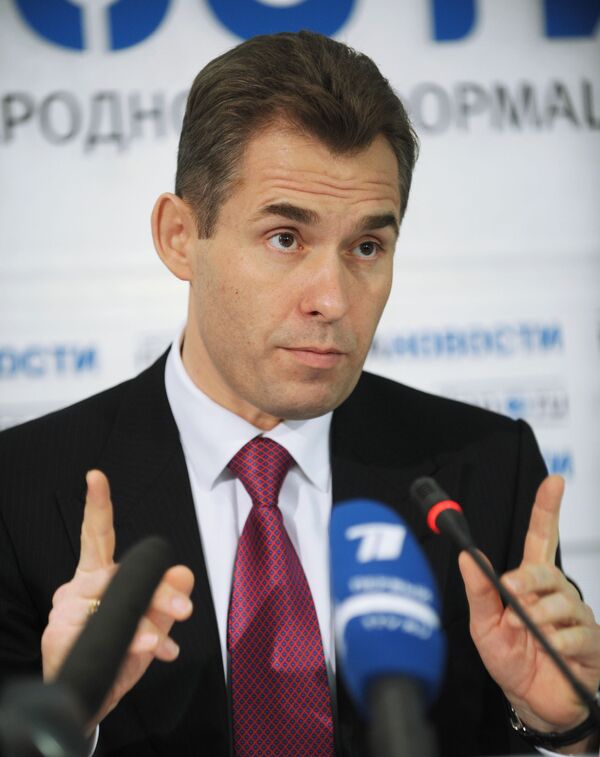WASHINGTON, February 19 (By Maria Young for RIA Novosti) The January death of a young boy adopted from Russia last year by American parents was called “suspicious” on Tuesday by Texas authorities investigating the case, but they stopped short of confirming the graphic evidence of abuse some Russian officials have claimed and said the parents have not been charged with any crime thus far.
“It’s always an attention grabber when it’s a child, it’s always upsetting, and our office felt it was a suspicious death, so we have opened an investigation,” said Sgt. Gary Duesler, Ector County, Texas Sheriff’s Department Public Information Officer, in an interview with RIA Novosti.
Texas Child Protective Services is looking into allegations of physical abuse and neglect, and the Ector County Medical Examiner’s office (ECME) is investigating the cause of the boy’s death.
“The child had some bruising but we don’t know what type of bruising, whether it was just little boys playing or something else,” Shirley Standefer, ECME chief investigator, told RIA Novosti.
Standefer said she was called to the emergency room at Medical Center Hospital in Odessa, Texas shortly after the boy died on Jan. 21.
“The forensic pathologist will be the one to determine whether the bruises were deep tissue bruising,” she added.
“Children don’t just drop over dead,” said ECME investigator Kim Herrington, who added it was normal practice for investigators from his office to look for a medical cause of death, particularly when a child has died.
According to information provided by Duesler, a 911 call for an ambulance came in at 4:49 p.m. CST (2249 GMT) on Jan. 21, and three-year-old Max Shatto, who was born Maxim Kuzmin, was transported from his home in Gardendale, Texas to the hospital in Odessa.
That information differs from what Russia’s child rights ombudsman, Pavel Astakhov, has said about the case.
“The boy died before an ambulance called by his mother arrived. According to a report by medical examiners, the boy had numerous injuries,” Astakhov said in a Tweet on Monday.
Astakhov also said the boy had been given powerful “psychotropic substances” and was badly beaten before his death.
Late Tuesday the Russian Embassy in Washington confirmed its officials had visited the “place of the accident” and met with the father, but made no mention of contact with the mother.
The embassy said Russia had “the deepest concern” over the fate of the boy and added, “If there is a criminal component to the child’s death, we expect those responsible to be severely punished.”
The Ector County Sheriff’s Department confirms it is working with Sergey Chumarev, the senior counselor for the Russian Embassy in Washington. Embassy officials would not confirm whether Chumarev had met with the father.
RIA Novosti tried contacting the Shatto’s, but an answering machine at their Texas home said, “If this is a reporter or a news agency, we have no comment.”
Just weeks after the Russian Federation banned American parents from adopting Russian children, news of the boy’s death enraged many officials in Russia and sent shockwaves through the US adoption community.
More than 60,000 Russian children have been adopted by Americans since the early 1990s, and this latest death brings the total number of known fatalities of Russian children to 20.
Russian officials have said they suspect many more children have been abused in the United States, and their concerns about the treatment Russian children receive at the hands of their American parents is what led to the ban.
Some say the Russian imposed adoption ban is a retaliatory measure against a US law called the Magnitsky Act, which imposes sanctions on Russian officials allegedly involved in human rights abuses.
More than a hundred American families that began the adoption process before the ban took plan are still hoping to finalize their cases in the coming weeks, according to US adoption officials.
“All the rest of our families in the process will be affected by this,” said Andrea Roberts, founder of Reece’s Rainbow, an organization which facilitates international adoptions for special needs children.
“If the US does not allow full open access to the information in this case, then in my opinion, it’s all over,” she said.
US Sen. Mary Landrieu, a proponent of adoptions who herself has adopted two children, said the death was tragic and should be fully investigated, but doesn’t justify a ban on all Russian adoptions by American parents.
“Contrary to current Russian opinion, child protection laws in the US protect both biological children as well as adopted children, and this case is no exception,” she said.
“Neither this case nor others that have so much media attention in Russia recently should provide an excuse for that government to close inter-country adoption and relegate thousands of their own children to vapid lives in institutional care.”


